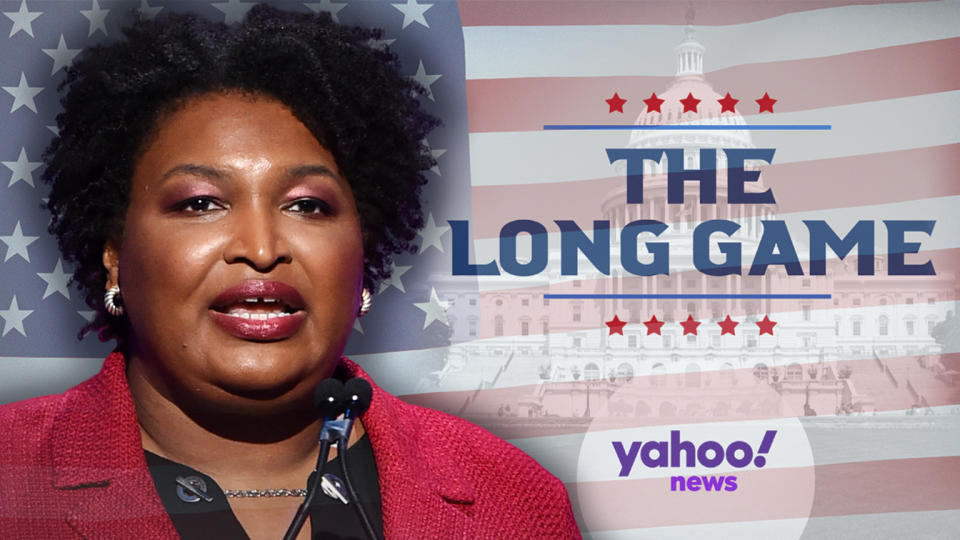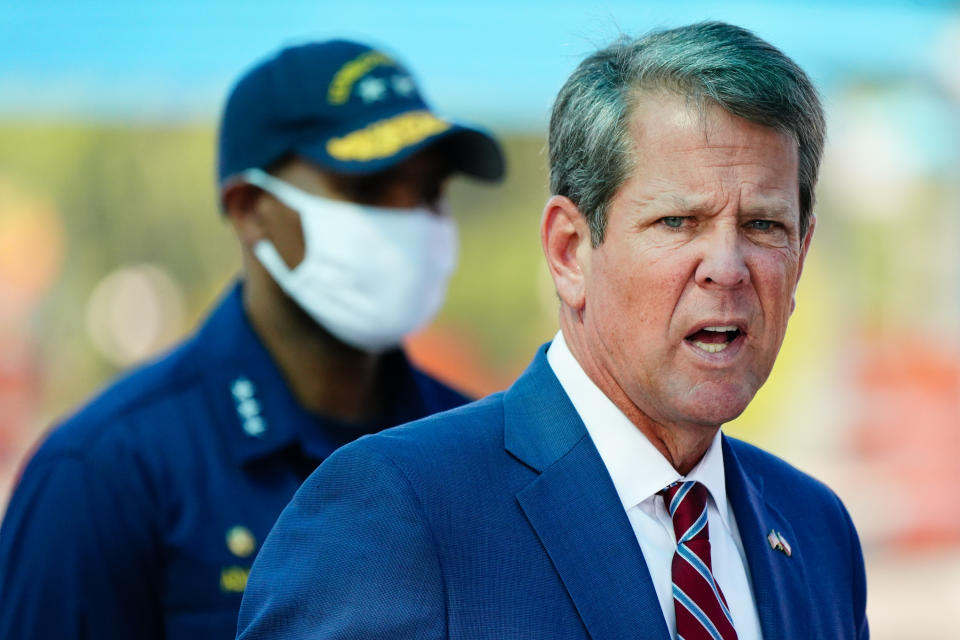Trump's suggestion to vote twice could put many in legal jeopardy, Stacey Abrams says
President Trump’s suggestion that people vote twice could make voters vulnerable to being accused of a crime and lead to longer lines and confusion at the polls, said former Georgia gubernatorial candidate Stacey Abrams.
“What’s most worrisome to me is that people who … were not the voters he was trying to encourage but are low-information about how the process works — which is most Americans — that you’re going to have good-intentioned people who are voting for the first time, who were drawn to this process because they want to do what’s right, who are going to be ... disproportionately and discriminatorily treated,” Abrams said in an interview with Yahoo News.

Abrams, a Democrat who ran for governor of Georgia in 2018 and was considered a potential running mate for Joe Biden, is the president of Fair Fight Action, a voting rights group. She said that while Trump was speaking to his own supporters this week, she is worried that those who don’t support him will also be confused and misled by his comments.
On Wednesday, Trump told supporters during a trip to North Carolina to “send [a mail-in ballot] in early and then go and vote.” He made several versions of this comment, telling a local TV station that it was part of an effort on his part to implore supporters to make sure their mail ballots were counted. “Let them send it in and let them go vote, and if their system’s as good as they say it is, then obviously they won’t be able to vote,” Trump said.
Karen Brinson Bell, the executive director of the North Carolina State Board of Elections, issued a statement noting that “it is illegal to vote twice in an election” and that “soliciting someone to do so also is a violation of North Carolina law.”
“The State Board office strongly discourages people from showing up at the polls on Election Day to check whether their absentee ballot was counted. That is not necessary, and it would lead to longer lines and the possibility of spreading COVID-19,” Brinson Bell said.
Abrams also said she is concerned that Trump’s comments would lead to longer lines at polling places, while also discouraging some voters from taking part at all.
Abrams spoke to Yahoo News alongside filmmakers Liz Garbus and Lisa Cortes, who co-directed and co-produced a new film about voter suppression and Abrams’s run for governor called “All In: The Fight for Democracy.”
Cortes defined voter suppression simply this way: “Are you able to register, are you able to cast your vote and will your ballot be counted? And if you are facing obstacles in exercising this most important right, then that is voter suppression.”
That definition includes any form of difficulty voting, and somewhat avoids the question of whether obstacles to voting have been erected with discriminatory intent.
But part of the reason that Abrams has become a prominent national voice, despite having lost her race for governor to Republican Brian Kemp, is that she is one of the most articulate and powerful spokespersons for the argument that the Republican Party has engaged in intentional voter suppression over the past two decades.

“Those who are using voter suppression in this era, they are mimicking past eras, but what they are doing is they precision-attack based on demography,” Abrams said. “Where they see pockets of people who were finally coming, not only into their power, but into the population for that power to matter, they’re doing their best to block them in their tracks.”
The film traces the history of voting rights back to the founding of America, through the post-Civil War era of Reconstruction and Jim Crow, and hinges much of its argument around the 2013 Supreme Court decision in Shelby County vs. Holder, which removed a key portion of the 1965 Voting Rights Act.
Prior to 2013, many Republican-controlled state legislatures had begun to pass voter ID laws aimed at stopping voters from fraudulently impersonating someone else to vote multiple times. Yet the past 20 years have seen little evidence of voter impersonation, despite zealous attempts to find it. And in some states, the specific rules on which IDs are valid for voting have had every appearance of having the intent to help certain voters and make it harder for others to vote. In Texas and Tennessee, those with gun permits can vote using that ID, but college students can’t use their student identification.
Barack Obama’s reelection in 2012 “led states like North Carolina and Wisconsin and other states to … start pulling back things like Sunday voting and early voting,” Abrams said. Early voting was a key driver of increases in Black voter turnout, especially on Sundays when many churches organized “Souls to the Polls” events after services.
After the Shelby decision, voter suppression tactics hit “warp speed,” she said, pointing to laws passed hours after the decision in Texas and the shutting down of more than 1,600 voting precincts since then, along with the removal of 19 million voters from rolls in different states.
Some election officials contest that voter rolls need to be kept up to date, and voting rights advocates agree but say that partisan officials who oversee elections in most states are incentivized to maintain voter rolls in an unfair manner. A solution, they say, is to make voter registration automatic when a citizen interacts with state government at the Department of Motor Vehicles or an equivalent agency, rather than forcing voters to register themselves.
“Inaccurate rolls cause confusion, expense, and disenfranchisement,” wrote Myrna Pérez, deputy director of the Democracy Program at the Brennan Center for Justice, in a report on election security. “They also create security risks because they are more vulnerable than clean rolls to bad actors trying to exploit out-of-date entries (for example, by voting under a person’s name or mailing a ballot for someone who is lawfully voting somewhere else).”
An automatic registration system would keep voter information far more up to date, and it would reduce the amount of confusion that results from having clerks enter information into their database from registrations filled out by hand. Both these things would greatly reduce the need for partisan officials to remove voters from the rolls or place their registrations on hold because of problems with their information.

In Georgia, Kemp was secretary of state for eight years before he ran for governor, and during that time he removed 1.5 million voters from the rolls, according to a report by the Brennan Center. Some were removed simply because they hadn’t voted in the last few elections.
In 2018, Kemp oversaw the election in which he was a candidate, and placed more than 50,000 voter registrations on hold under his “exact match” policy, which flagged any small discrepancy between the registration form and information in the state databases.
These policies were found to affect low-income voters and minorities disproportionately, as did the lack of sufficient polling places in major urban areas in and around Atlanta, where long lines were experienced far more by Black voters.
Abrams established Fair Fight Action after losing to Kemp by 55,000 votes out of 3.9 million cast. She said at the time that she recognized that Kemp is governor under the law, but pointedly refused to refer to him as “legitimate.” She did not go so far as Ohio Sen. Sherrod Brown, a Democrat, who said that it was a “stolen election.”
But Abrams did say Kemp engaged in a “deliberate and intentional” program of “systemic disenfranchisement” of voters, primarily African-Americans.
_____
Read more from Yahoo News:

 Yahoo Sports
Yahoo Sports 

